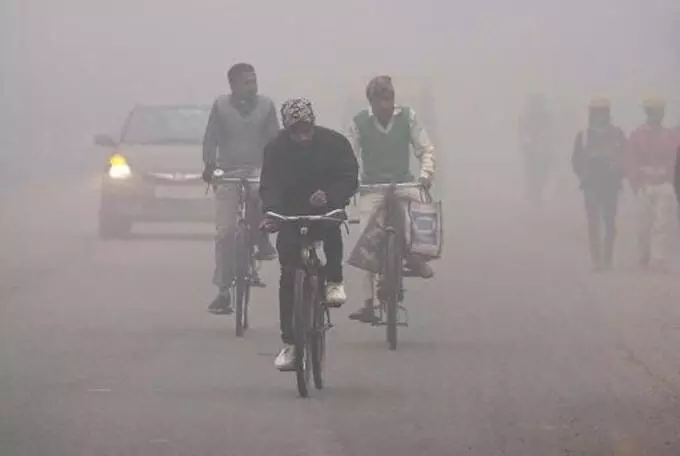Cold Wave Alert: Telangana govt issues health advisory
Citizens are advised to take precautions to prevent respiratory infections and cold-related illnesses
By Anoushka Caroline Williams
Representational image
Hyderabad: The Government of Telangana, through the Office of the Director of Public Health and Family Welfare, has issued a comprehensive health advisory addressing the rising risk of seasonal flu and the potential impact of cold wave conditions across the state.
Citizens are advised to take precautions to prevent respiratory infections and cold-related illnesses as the India Meteorological Department (IMD) forecasts dry weather and temperatures dropping below 15°C in several districts.
How it spreads:
The virus spreads through droplets when an infected person coughs or sneezes.
Who is at risk?
Certain groups are more vulnerable to severe illness, including:
• Pregnant women
• Children under five
• Older adults (65+ years)
• Individuals with chronic medical conditions such as cardiac, pulmonary, or metabolic disorders
• Immunocompromised individuals
Precautionary Measures:
• Cover your mouth and nose with a tissue or handkerchief when coughing or sneezing.
• Wash hands frequently with soap and water.
• Avoid touching your face and close contact with sick individuals.
• Stay hydrated, eat nutritious food, and get adequate rest.
Dr. B. Ravinder Nayak, Director of Public Health, emphasized, “People with high fever, difficulty breathing, or altered behavior should consult a doctor immediately. Public health facilities have been equipped with special beds and essential medicines.”
Cold Wave and Frost: An Overview
What is a Cold Wave?
A cold wave is a sharp drop in air temperature accompanied by strong winds or frost. According to IMD, a cold wave in plains occurs when temperatures are 10°C or below and show significant deviations from normal levels.
Vulnerable Groups:
• Homeless individuals
• Elderly and children
• Pregnant or lactating women
• Outdoor workers and economically disadvantaged populations
Health Impacts:
Exposure to extreme cold can cause hypothermia, frostbite, and other conditions such as chilblains and trench foot.
Dr. Raji Kumar, a general physician, stated,
“Cold weather increases the risk of hypothermia, especially among older adults and those exposed to wet or windy conditions. Immediate warming and medical care are critical in such cases.”
Cold-Related Health Risks
1. Hypothermia:
Prolonged exposure to cold can lead to dangerously low body temperatures, affecting brain function and movement. Symptoms include shivering, confusion, slurred speech, and drowsiness.
2. Frostbite:
Frostbite damages skin and underlying tissues, often affecting extremities like fingers, toes, and ears. Symptoms include numbness and pale or waxy skin.
3. Chilblains and Trench Foot:
Chilblains result from repeated exposure to cold, damp conditions, while trench foot occurs when feet remain wet for long periods. Both can cause swelling, redness, and pain.
Precautions Against Cold Wave
Do’s:
• Wear layers of loose-fitting, warm clothing.
• Keep yourself dry and cover exposed body parts like the head, neck, and hands.
• Eat nutritious food and drink warm fluids.
• Stay indoors and minimize travel.
• Check on elderly neighbors and provide adequate shelter for pets.
Don’ts:
• Avoid consuming alcohol, as it lowers body temperature.
• Do not rub frostbitten skin or use direct heat sources.
• Avoid prolonged exposure to cold winds.
Dr. Nidhi Sharma, a public health expert, advised,
“Staying informed about weather conditions and taking preventive measures like proper clothing and hydration can significantly reduce the risk of cold-related illnesses.”
Emergency Measures
• For Seasonal Flu:
Call 108 ambulance services in health emergencies.
• For Cold Wave-Related Issues:
Monitor weather updates on IMD’s website and ensure proper insulation at home.
Public health facilities are on alert to handle any surge in cold wave-related cases. Citizens are urged to follow government advisories and seek timely medical care for severe symptoms.
For detailed guidelines on cold wave prevention and management, visit the National Disaster Management Authority’s resources page.